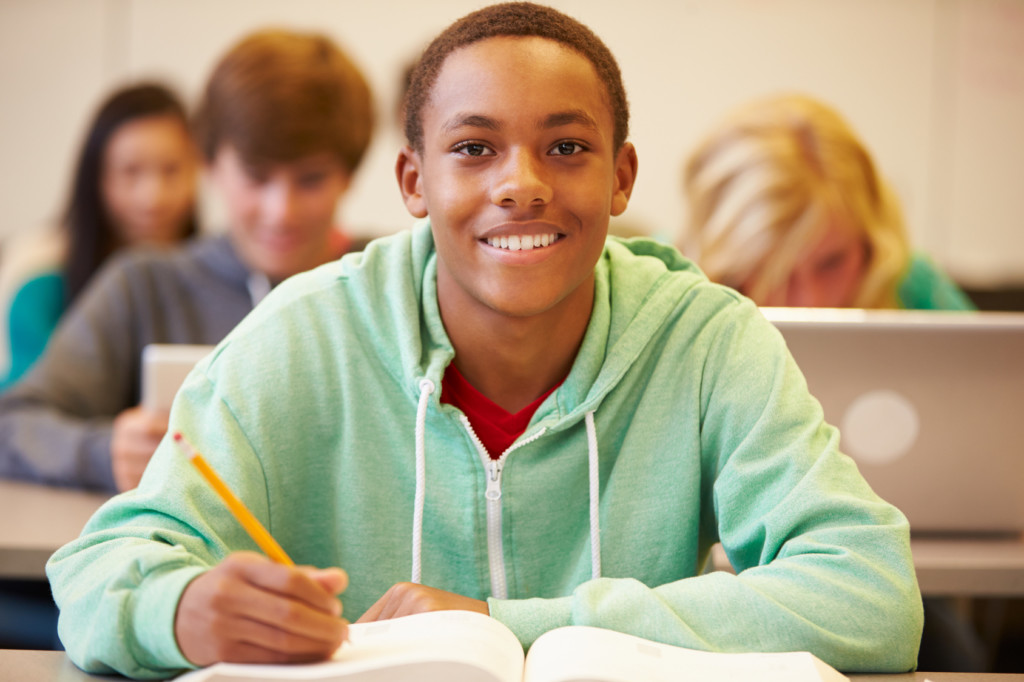Study Tips – 4 Effective Strategies for Student Success | Kellie-Anne Brown-Campbell

FOUR EFFECTIVE STUDY TIPS
Study skills are not only important for GSAT, PEP, Common Entrance, 11+ or SEA (what a mouthful!) but also for the rest of a students academic career and right into college. Standardized tests -Assessments and Diagnostics – are used to measure knowledge and track progress as early as Grade 3. Primary level students must learn to develop healthy, effective and efficient study skills. These “soft skills” help with being successful on tests and exams. They will also inevitably result in reduced levels of stress and anxiety for the student. Here are four important study tips that parents, caregivers and teachers can teach children to employ on a regular basis.
Study Tip #1: Study in ‘batches’
Avoid studying too much all at once!
Despite the old adage – “the more the merrier”, when it comes to studying, too much is NOT better. If students studying for hours at a time without breaks, they will receive diminishing returns. Our brains were made to process only so much information at any one time! Taking short breaks in between study sessions, allows our brains to process, make sense of, and efficiently store the information read. This is especially true for subjects that are very loaded with content such as Social Studies, Science or Religious Education. Short breaks allow the brain to organize the material and prepares the student to retrieve this information more readily. A tired brain is not able to effectively store information in long term memory, making it harder to recall.
A Grade 6 student could study for 20 – 25 minutes with a 10 minute break away from the book with some light physical activity.
Younger students may need to use smaller blocks of time starting with 10-15 minutes in Grade 3.
Study Tip #2: Develop a consistent study routine and schedule
This tip is critical to developing organisation skills, and training the brain and body to be ready and receptive to studying. When we train ourselves to get up at the same time every morning eventually we are able to wake at the same time even without an alarm clock. In the same way we can make our brains more receptive to focused and concentrated work if we study at the same times consistently. Having a schedule that the student develops for him or herself, with the assistance of an adult, helps that student to be more organised and deliberate about studying. Additionally, it helps to develop discipline and accountability, just like when training for a sport.
Study Tip #3: Create a Low-Tech study environment
“Is low-tech possible in this technology age?!?” There is a lot of research available – for both adults and children – on how “disconnecting” helps make us more productive. How many times have you checked WhatsApp since starting to read this article? Too often we adults are “plugged in” to our phones and laptops, teaching our children that these devices are necessary appendages. Even when this does not happen at home, children see this on the television, and other daily encounters.
We have to start training our children to “disconnect” and focus on one thing at a time.
Multitasking is really a myth. When we think about, we realize that technically we cannot give our attention to more than one thing at a time. If your child is writing a composition and has the television on, whenever she looks up to watch, she has stopped working on the composition. Children may say that they can focus on more than one thing at a time, but this is neurologically impossible.
Study Tip #4: Studying and music
Many parents who I have come in contact with throughout my practice have expressed concern about their children listening to music when studying. This is not always a bad idea! But, what type of music? Research has found that more up-tempo music, without lyrics may help improve our mood when studying. Music with lyrics can be distracting. Imagine listening to Pharrell’s “Happy” while studying Social Studies – you may unconsciously break into song! Classical music and music involving sounds of nature may help to calm and relax the mood. Some strains of classical music stimulate the brain making us more receptive to learning and enhancing memory. Research has found that listening to music when doing more repetitive tasks may help us to move faster and enjoy the task more; for example, when filling out a spreadsheet. So, the point is, choice of music is key.
***
Successful students are consistent and disciplined. They make plans and hold themselves accountable. Successful students tend to be self-motivated, able to set goals for themselves and work towards their goals. Throughout the year we must encourage our students to develop healthy habits such as described in these study tips. When exams begin, our students will be in good stead for academic success. The skills instilled by consistent practice of these study tips will place students at an advantage for life.
Written by Kellie-Anne Brown-Campbell, a licensed School Psychologist who conducts educational assessments at Caribbean Tots to Teens.
Learn MoreAfter GSAT

GSAT results are out!
So, what’s next?!?!
THANK GOD, whoever you perceive Him to be. The examination is done, the grades are out, and primary school is nearly completely finished. You did it, with His help.
HUG YOUR CHILD! Hug your child because their hard work and sacrifice brought them to this point. You were there; you know what they went through. Whatever the placement may be, they worked for it and achieved it. Your child NEEDS to KNOW that you love them. CELEBRATE!
BREATHE. No matter what you can do today, one thing you cannot do is relive the past, so breathe and embrace the future that lies ahead. There will be much preparation to do this summer, lots of running around and ground work:
Uniforms (rules for shoes, hairstyles, socks, school-bags)
Book lists
New students’ handbooks
Orientation schedule
After school activity planning
Learning a new route to school
With all that and more, don’t forget to…
BE GRATEFUL: Remember everyone who helped, prayed, taught, supported your family in one way or another during the difficult preparation. Whether it is a phone call, a short note, a card or a present take the time to be grateful. Teach your child to thank them!
ENJOY THE SUMMER: your baby is growing up. Don’t waste one moment of this summer holiday – enjoy as MUCH as you can, because this is the last summer before high school. Secondary school marks a new phase of life: ever-increasing independence, less confiding in parents, more confiding in friends. Teenagers! But that is for tomorrow,
for today … Rejoice!
Pre-register and save! GSAT: Parenting Seminar
Parents who complete pre-registration on-line pay only $1000.00 on the day of the seminar.
Enter the word: ‘registration’ and your day of choice (Saturday / Sunday)
in the comments box to Pre-register by Sept 7 and SAVE!
Error: Contact form not found.
Learn MoreA GSAT alternative? JamaicaObserver.com
A GSAT alternative? – Careers & Education – JamaicaObserver.com.
THE Caribbean Primary Exit Assessment (CPEA) — which is expected to provide the foundation for a seamless transition to secondary level education while facilitating portability of qualifications across the region — is to be piloted in four Jamaican schools in September.
CPEA, whose administrators the Caribbean Examination Council (CXC) describe as an assessment of the literacies required by all pupils exiting the primary school system, was fully rolled out in Grenada and Anguilla this academic year. It is also to be introduced to St Lucia, St Vincent and the Grenadines as well as Dominica in the new school year. Under CPEA, the continuous assessment accounts for 40 per cent of the final score, while an exam makes up the other 60 per cent.
Cumberbatch said the educators in the chosen schools have already been trained in the use of the methodology, which he explained was a kind of school-based assessment in which students would, for example, have to produce several pieces of written work, each of which would be assessed by the teacher with corrections and improvements made by the student.
We are eager to explore all the options and alternatives to the current GSAT examination. Our Caribbean brothers and sisters might be a good resource for us. Lets hear more about this!
Learn MoreMore GSAT scholarship awardees this year
This is a beautiful manifestation of the hard work and solid effort from the Principals and Teachers, Parents and Students in the primary school system today!!! Congratulations to ALL
More GSAT scholarship awardees this year – Lead Stories – Jamaica Gleaner – Friday | July 13, 2012.
Learn MoreThe list of scholarship winners published by the Ministry of Education in yesterday’s daily newspapers revealed that seven of the 25 government scholars are from primary schools, compared to only one out of 24 last year. In total 50 of the 96 students who received scholarships are from public institutions which represents an increase compared with 21 of 65 students last year.According to Education Minister Ronald Thwaites, the result reflects a diversion from what has been the norm where a specific group of schools dominated the list. He said the mixture among the schools was welcomed by the Ministry of Education. “Quality education is to be found across the system and this is an indication of it,” Thwaites said. He said there has been an improvement at some schools as a result of their effort to improve the standards of the students. “There has been better preparation, all credit to the teachers and to the parents. What we need to do in our education system is to stress equity and quality,” he added.
Parental Support Critical to School Development
In a letter published in the Gleaner today, the critical role of parents is highlighted as one of the three MAIN factors in school development.
A school becomes competitive when it has an effective principal, disciplined students and good parental support. Check many of these non-traditional high schools and see if they have those three driving factors.
We wholeheartedly agree that parents cannot “sit back and rest once” their child begins secondary school studies. We support all efforts to equip and support parents in their continuing essential role in child development and school development.
Learn MoreAlso, too many parents are laid back. They don’t care about what goes on at their children’s school. It is time they demand that the school improves in the areas that keep the school rooted at the bottom of the academic rankings. After all, they are the main stakeholders in the school and need to use up their power.











